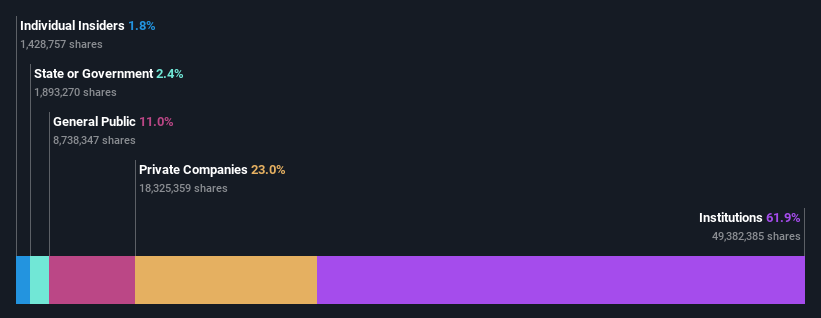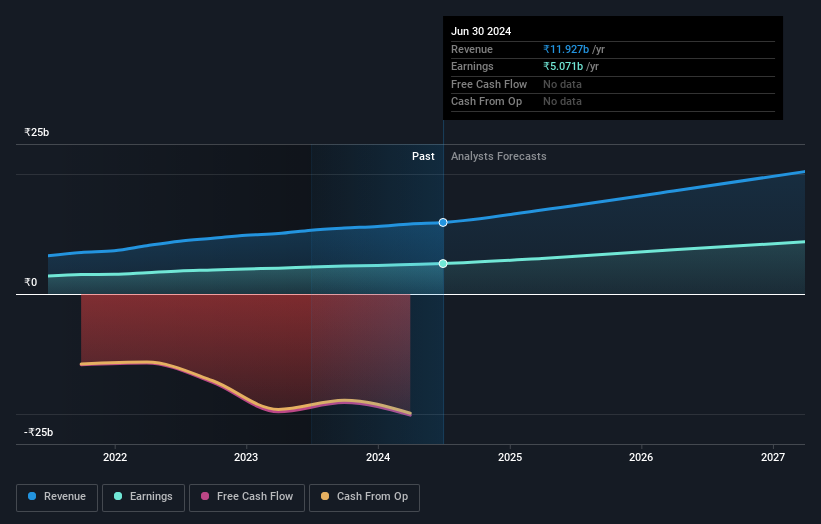- India
- /
- Diversified Financial
- /
- NSEI:AAVAS
After a year of 3.8% returns, Aavas Financiers Limited's (NSE:AAVAS) share price drop last week may have less of an impact on institutional investors
Key Insights
- Significantly high institutional ownership implies Aavas Financiers' stock price is sensitive to their trading actions
- 51% of the business is held by the top 8 shareholders
- Using data from analyst forecasts alongside ownership research, one can better assess the future performance of a company
A look at the shareholders of Aavas Financiers Limited (NSE:AAVAS) can tell us which group is most powerful. We can see that institutions own the lion's share in the company with 62% ownership. That is, the group stands to benefit the most if the stock rises (or lose the most if there is a downturn).
No shareholder likes losing money on their investments, especially institutional investors who saw their holdings drop 3.3% in value last week. However, the 3.8% one-year return to shareholders might have softened the blow. They should, however, be mindful of further losses in the future.
Let's delve deeper into each type of owner of Aavas Financiers, beginning with the chart below.
See our latest analysis for Aavas Financiers

What Does The Institutional Ownership Tell Us About Aavas Financiers?
Institutions typically measure themselves against a benchmark when reporting to their own investors, so they often become more enthusiastic about a stock once it's included in a major index. We would expect most companies to have some institutions on the register, especially if they are growing.
Aavas Financiers already has institutions on the share registry. Indeed, they own a respectable stake in the company. This can indicate that the company has a certain degree of credibility in the investment community. However, it is best to be wary of relying on the supposed validation that comes with institutional investors. They too, get it wrong sometimes. When multiple institutions own a stock, there's always a risk that they are in a 'crowded trade'. When such a trade goes wrong, multiple parties may compete to sell stock fast. This risk is higher in a company without a history of growth. You can see Aavas Financiers' historic earnings and revenue below, but keep in mind there's always more to the story.

Investors should note that institutions actually own more than half the company, so they can collectively wield significant power. Aavas Financiers is not owned by hedge funds. Our data shows that Lake District Holdings Limited is the largest shareholder with 15% of shares outstanding. With 8.5% and 7.5% of the shares outstanding respectively, SBI Funds Management Limited and Partners Group ESCL Limited are the second and third largest shareholders.
On further inspection, we found that more than half the company's shares are owned by the top 8 shareholders, suggesting that the interests of the larger shareholders are balanced out to an extent by the smaller ones.
While it makes sense to study institutional ownership data for a company, it also makes sense to study analyst sentiments to know which way the wind is blowing. There are plenty of analysts covering the stock, so it might be worth seeing what they are forecasting, too.
Insider Ownership Of Aavas Financiers
While the precise definition of an insider can be subjective, almost everyone considers board members to be insiders. Company management run the business, but the CEO will answer to the board, even if he or she is a member of it.
Most consider insider ownership a positive because it can indicate the board is well aligned with other shareholders. However, on some occasions too much power is concentrated within this group.
We can report that insiders do own shares in Aavas Financiers Limited. It is a pretty big company, so it is generally a positive to see some potentially meaningful alignment. In this case, they own around ₹2.5b worth of shares (at current prices). It is good to see this level of investment by insiders. You can check here to see if those insiders have been buying recently.
General Public Ownership
With a 11% ownership, the general public, mostly comprising of individual investors, have some degree of sway over Aavas Financiers. While this group can't necessarily call the shots, it can certainly have a real influence on how the company is run.
Private Company Ownership
It seems that Private Companies own 23%, of the Aavas Financiers stock. Private companies may be related parties. Sometimes insiders have an interest in a public company through a holding in a private company, rather than in their own capacity as an individual. While it's hard to draw any broad stroke conclusions, it is worth noting as an area for further research.
Next Steps:
While it is well worth considering the different groups that own a company, there are other factors that are even more important. For instance, we've identified 1 warning sign for Aavas Financiers that you should be aware of.
But ultimately it is the future, not the past, that will determine how well the owners of this business will do. Therefore we think it advisable to take a look at this free report showing whether analysts are predicting a brighter future.
NB: Figures in this article are calculated using data from the last twelve months, which refer to the 12-month period ending on the last date of the month the financial statement is dated. This may not be consistent with full year annual report figures.
New: Manage All Your Stock Portfolios in One Place
We've created the ultimate portfolio companion for stock investors, and it's free.
• Connect an unlimited number of Portfolios and see your total in one currency
• Be alerted to new Warning Signs or Risks via email or mobile
• Track the Fair Value of your stocks
Have feedback on this article? Concerned about the content? Get in touch with us directly. Alternatively, email editorial-team (at) simplywallst.com.
This article by Simply Wall St is general in nature. We provide commentary based on historical data and analyst forecasts only using an unbiased methodology and our articles are not intended to be financial advice. It does not constitute a recommendation to buy or sell any stock, and does not take account of your objectives, or your financial situation. We aim to bring you long-term focused analysis driven by fundamental data. Note that our analysis may not factor in the latest price-sensitive company announcements or qualitative material. Simply Wall St has no position in any stocks mentioned.
About NSEI:AAVAS
Aavas Financiers
Provides housing finance services to low- and middle-income customers in semi-urban and rural areas in India.
Proven track record with moderate growth potential.
Similar Companies
Market Insights
Community Narratives




